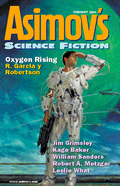
| Editor: | Sheila Williams |
| Issue: | Volume 29, No. 2 |
| ISSN: | 1065-2698 |
| Pages: | 144 |
Three issues of F&SF and only one issue of Asimov's isn't enough to go on, but so far at least I like Asimov's better. None of the stories here blew me away, but there also wasn't a clunker in the bunch, and I enjoyed the poetry quite a bit more than I expected to.
The books column was disappointing, with just plot summaries and very little in the way of review. James Patrick Kelly's column was good enough, I suppose, but I've heard way more than this about DRM and don't really want to read more basic introductions. Making up for those, though, I really enjoyed Robert Silverberg's column.
"The 120 Hours of Sodom" by Jim Grimsley: I was hooked with the concept, but the execution dragged badly (pun fully intended). I could have done with way less description and way more characterization, and the characters weren't deep enough by the end of the story for the ending to have anywhere near the meaning or impact that it could have. A mostly wasted idea. (5)
"Angel Kills" by William Sanders: How can you resist a story about a bunch of biplane pilots who risk their lives shooting down angels who are trying to rip apart passenger airlines? Particularly when their weapon is a giant flashlight? A bizarre setup played perfectly straight and making a nice point about belief. The only thing I could have asked for was more detail on just what the angels were, but of course that would have defeated the point. (7)
"The Two Old Women" by Kage Baker: A fairy tale with a very straightforward plot, but one that's nicely told, particularly at the end. The relationship between sailors' wives and the sea is not a new concept, and Baker doesn't go anywhere profound with it, but this story still worked for me. (6)
"Parachute Kid" by Edd Vick: This is one of those time travel stories that's built around horribly twisted causality, but I loved the fire-fighting twist added in. Alas, despite the setup of a few possible themes, the story doesn't really go anywhere, just sits on the page being complicated and cute. (6)
"Polyhedrons" by Robert A. Metzger: I had a hard time getting through the opening of this one. It starts oddly surreal in a mind-bending, extreme cyberpunk sort of way. Bear with it, though; all of this chaos does actually have a point, and in the end it has a nice, thoughtful payoff. (6)
"Dead Men on Vacation" by Leslie What: It's a story about the Holocaust and Nazis, the moral is obvious once it hits, and there isn't much complexity or depth to how it gets there, but this story just worked for me. And I rarely like Holocaust stories. This may be an idiosyncratic opinion, since there really isn't anything new here, but I think this was the best story of the issue. (7)
"Oxygen Rising" by R. Garcia y Robertson: Straightforward space opera at novelette length. All the pieces are here: gene-tailored humanity, interstellar war, a love affair, odd aliens, and a standard sort of plot twist. I think there's even a political subtext about the nature of terrorism and the incomprehending arrogant superiority of the "civilized" side with its superior economic and military power, although I may have been reading a bit too much into it. Regardless, an enjoyable romp, even if a few of the plot hooks never get used for anything. (7)
Reviewed: 2005-03-05